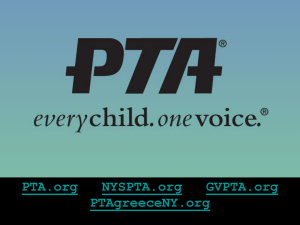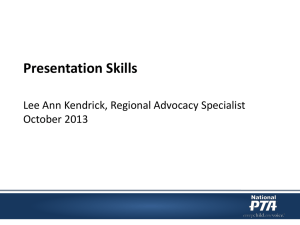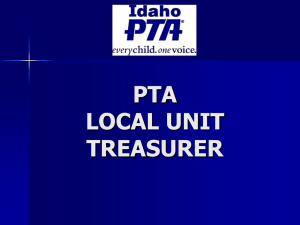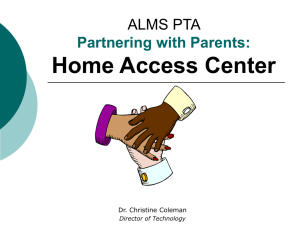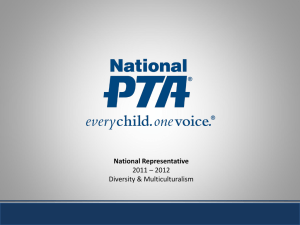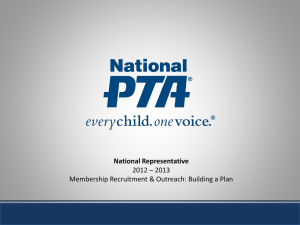(PA/PTA)? - LearnDOE
advertisement
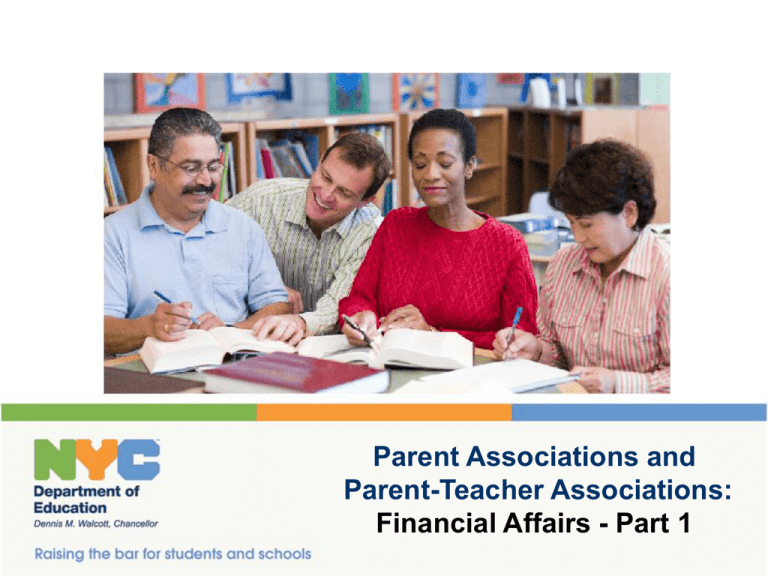
Parent Associations and Parent-Teacher Associations: Financial Affairs - Part 1 Part 1 - Session Overview What is a PA/PTA? Financial Responsibilities of the PA/PTA PA/PTA Bylaws and Financial Practices The Role of PA/PTA Treasurer PA/PTA Financial Records The PA/PTA Checking Account Tax Exempt Status for PA/PTAs 2 What Is A Parent or Parent-Teacher Association (PA/PTA)? Under State Education Law, Section 2590, every New York City public school is required to form a Parent Association or Parent-Teacher Association. The PA/PTA is a school-based membership organization whose activities are expected to be aligned with the educational goals of the school community. The PA/PTA must adopt bylaws that conform to the requirements of Chancellor’s Regulation A-660. 3 Financial Responsibilities of the PA/PTA The PA/PTA must develop bylaws, elect officers, and hold regular meetings. A bylaws template can be downloaded from: http://schools.nyc.gov/parentleadership (bylaws must be approved by membership). The PA/PTA is responsible for its own financial transactions and record-keeping, which includes, but is not limited to the maintenance of all records such as receipts for purchases, memos of reimbursement, and bookkeeping records. The PA/PTA Treasurer has primary responsibility for the maintenance of all records relating to the financial transactions of the organization. The treasurer must ensure that complete and accurate financial records are maintained and updated regularly. NOTE: Debts incurred by a PA or PTA are the responsibility of the PA or PTA and are not the responsibility of the school, district or the DOE. 4 PA/PTA Bylaws and Financial Practices The PA/PTA bylaws must include, at a minimum, the following financial practices: The counting and handling of any cash, checks, or money orders received by the PA/PTA, must be completed by at least two PA/PTA members. These PA/PTA members may not be related by blood or marriage. Funds must be counted in the school on the same day of receipt. The PA/PTA’s financial records must display the total amount of funds and the signatures of the PA/PTA members who participated in counting the funds. Documentation related to every transaction must be maintained at the school (e.g., cancelled checks, deposit receipts, purchase orders, PA minutes related to the financial transactions, etc.). 5 PA/PTA Bylaws and Financial Practices The PA/PTA bylaws must include, at a minimum, the following financial practices: No parent or staff member shall collect fundraiser proceeds from any student without written approval from the principal. All funds shall be deposited in the bank account by authorized executive board members within 24 hours of receipt, whenever possible. PA/PTA funds must be taken to the bank for deposit by at least two authorized members. No funds shall be kept in a member’s place of work or residence. PA/PTA funds that are not deposited immediately must be secured in a locked location on school premises (e.g., the school safe). The PA/PTA must obtain a written acknowledgement from the principal when PA/PTA funds are secured in the school. 6 Snapshot: PA/PTA Bylaws Template FACE has developed a PA/PTA bylaws template that outlines financial and budgeting practices which—at minimum—must be followed by the PA/PTA. The template is available here: http://schools.nyc.gov/parentleadership. 7 The Role of the PA/PTA Treasurer The Treasurer has primary responsibility for the maintenance of all records relating to the financial transactions of the PA/PTA. The treasurer must ensure that complete and accurate financial records are maintained and updated regularly.. The PA/PTA bylaws must include the Treasurer’s general duties and responsibilities. The Treasurer must prepare and distribute a written report at every executive board and general meeting. This report must include a statement of all transactions, including income (e.g., fundraiser proceeds, donations) and expenditures (e.g., purchases, refunds, reimbursements), as well as opening and closing balances for the reporting period. Copies of the PA/PTA Treasurer’s Report must be given to the principal and posted on the parent bulletin board (if available). 8 Examples of PA/PTA Financial Records Financial records are all records that reflect the PA/PTA’s income, expenditures, refunds and any other financial transaction. Examples of these records include: Bank Statements, ledgers (receipts and disbursements), deposit slips, cancelled checks, voided checks, purchase orders Vendor Contracts Invoices (paid and outstanding) Resolutions Receipts Checkbooks Employer Identification Numbers (EIN) Tax Exempt Certificates Proposed and Approved Budgets Interim Financial Report Annual Financial Report Treasurer’s Report Financial Activity Report PA/PTA minutes related to the financial transactions 9 The PA/PTA Checking Account PA/PTA funds must be deposited into a checking account that is opened/established in the PA/PTA’s name. To apply for a banking account the PA/PTA must first acquire its own Employee Identification Number (EIN) from the Internal Revenue Services (IRS)*. The PA/PTA’s EIN must be kept on file with the principal. Banks may require a letter signed by principal (on school letterhead) to open a PA/PTA checking account or to change signatories. All PA/PTA checks must be signed by two authorized signatories. The bylaws must state at least three different officers who will be authorized signatories. Checks may not be made payable to “petty cash” or “cash.” Doing so is a violation of Chancellor’s Regulation A-660. The PA/PTA may not use ATM cards or withdrawal slips. *Apply for an EIN online. 10 Tax Exempt Status for PA/PTAs The PA/PTA may apply for an Exempt Organization Certificate from the NYS Department of Taxation and Finance. If granted, the PA/PTA will receive a six-digit NYS sales tax exemption number. The PA/PTA may not use the DOE’s tax exemption number. Visit the New York State Department of Taxation and Finance online for more information. If a PA/PTA desires to become a 501(c)(3) organization, they must retain their own counsel and must abide with all applicable laws, policies, rules, regulations, bylaws and other requirements. Visit the IRS online for more information. 11 Part 2 - Session Overview PA/PTA Fundraising Activity Guidelines Interim and Annual Financial Reports Preparing and Approving the PA/PTA Budget Review and Audit of the PA/PTA Records PA/PTA’s Best Practice Tips 12


